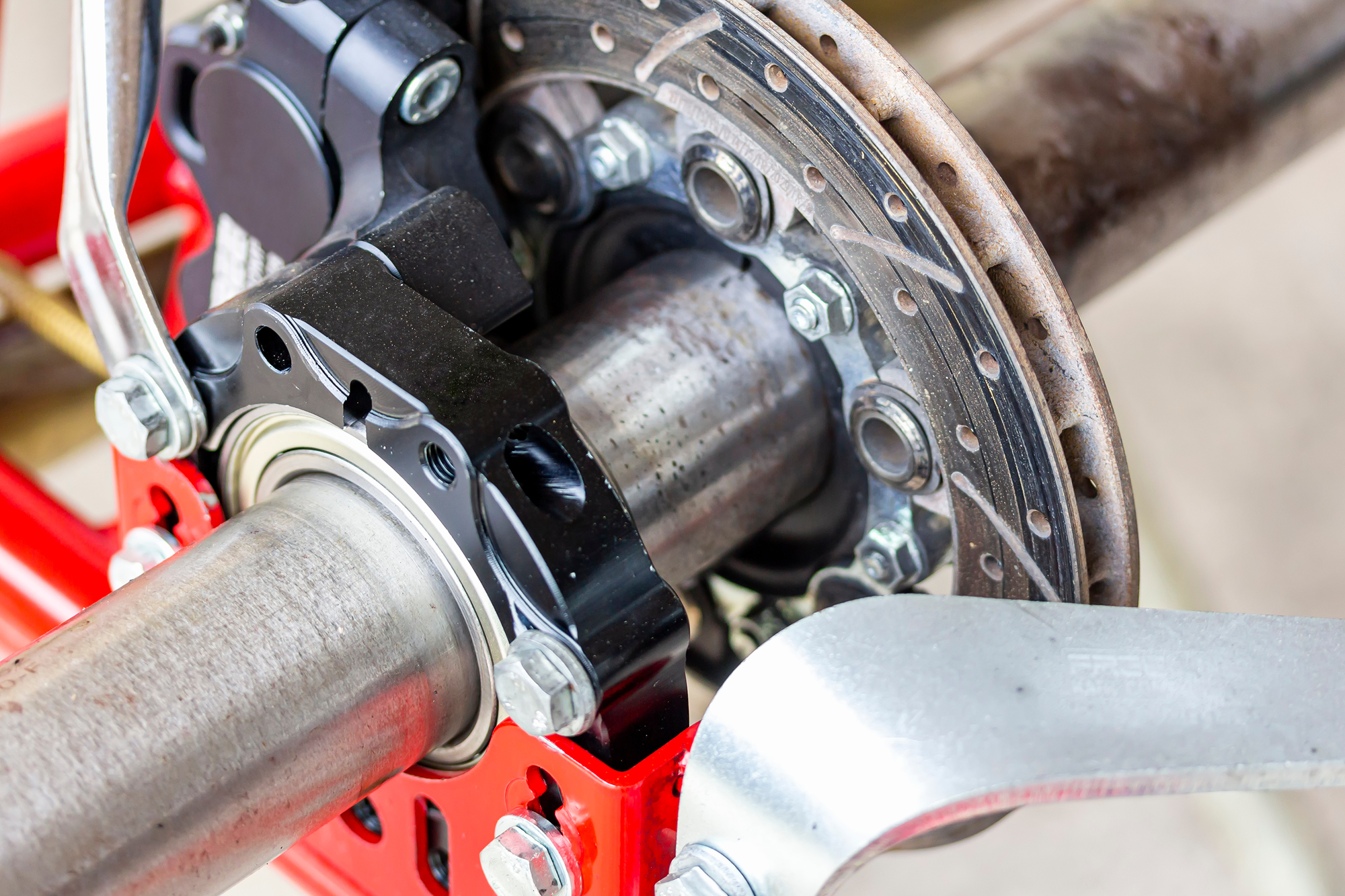Recognizing the Warning Signals: Key Indicators of Hydraulic Brake System Failure
If your hydraulic brake system shows signs like squealing or grinding noises, it’s time to act. A soft or spongy pedal indicates air or fluid issues, while vibrations during braking suggest warped rotors. Notice longer stopping distances? That could mean worn pads or a failing master cylinder—a dashboard warning light alerts you to low fluid or malfunctioning components. If your vehicle pulls to one side, uneven brake wear is likely. Ignoring these signs can compromise safety and lead to costly repairs. Following closely will help you understand more about maintaining brake efficiency and safety. If you are looking for professional services of brake repair in Camas WA, contact Springs Brake and Suspension today.
Squealing or Grinding Noises
Squealing or grinding noises from your brakes can be alarming and shouldn’t be ignored. Squealing noises often indicate that your brake pads are worn and need replacement. If you hear these sounds, addressing them promptly can prevent further damage to your rotors.
Grinding noises, on the other hand, suggest that the brake pads are completely worn down. This leads to metal-on-metal contact that can severely damage your brake system. Ignoring these noises can result in significant repair costs due to rotor replacement and compromised braking efficiency.
Regular inspections are essential; early detection of abnormal sounds ensures your braking system functions effectively and safely. If you notice unusual noises, seek immediate attention to maintain optimal performance and safety.
Soft or Spongy Brake Pedal

When you notice a soft or spongy brake pedal, addressing the issue promptly is crucial, as it can significantly impair your vehicle’s braking performance.
This sensation often indicates air trapped in the brake lines, which reduces braking effectiveness and response time. Low brake fluid levels can also contribute to a spongy pedal feel, signaling potential leaks or contamination within the hydraulic system.
If your brake pedal sinks to the floor when pressed, it may indicate a failing master cylinder, which requires immediate inspection. Ignoring these symptoms can lead to increased stopping distances, which can pose a significant risk during emergency braking situations.
Regularly checking brake fluid levels and conducting maintenance can help prevent a soft or spongy brake pedal.
Do you need brake repair services?
For expert assistance, contact Springs Brake and Suspension today!
Vibrations During Braking
Experiencing vibrations during braking signals that your vehicle’s braking system needs attention.
These vibrations or pulsations often indicate warped rotors, which can occur from excessive heat generated during aggressive driving or prolonged brake use. Warped rotors lead to uneven braking, causing your vehicle to shake or vibrate, compromising stability during emergency stops.
This issue can significantly reduce braking performance and may increase stopping distances. You should schedule a brake inspection immediately to assess the condition of your rotors.
Ignoring these vibrations can escalate into more severe brake system failures, resulting in costly repairs and heightened safety risks. Addressing warped rotors promptly will ensure your vehicle remains safe and responsive.
Longer Stopping Distances
Longer stopping distances can signal serious issues within your hydraulic brake system that require immediate attention. Ignoring these signs can lead to dangerous situations on the road.
Here are some key indicators:
- Worn brake pads reduce effectiveness
- Low or contaminated brake fluid affecting hydraulic pressure
- Malfunctioning master cylinder hindering brake response
If you notice longer stopping distances, it could indicate worn brake pads or low brake fluid levels, which could compromise safety. A malfunctioning master cylinder may also prevent proper hydraulic force transmission.
Regular brake checks are crucial to ensure your brake system operates efficiently. Don’t take chances; address these concerns promptly to maintain vehicle safety and performance.
Dashboard Warning Light
Dashboard warning lights frequently signal critical issues within your hydraulic brake system that require immediate attention.
The brake warning light can indicate low brake fluid levels or worn brake pads, jeopardizing your braking efficiency and overall safety. Ignoring this alert may lead to decreased performance or even brake failure, increasing your risk of an accident.
A solid brake warning light often points to anti-lock braking system (ABS) issues, while a flashing light indicates a more urgent problem that needs swift diagnosis.
Regular maintenance and timely responses to these alerts are essential to ensure your hydraulic system operates effectively and retains its safety features.
Don’t take any chances; address these warnings promptly to maintain safe driving conditions.
Pulling to One Side
A vehicle that pulls to one side during braking signals a critical issue that demands immediate attention. This condition often stems from uneven brake pad wear, which significantly compromises stopping power and vehicle stability.
- Stuck caliper leading to unequal braking force
- Brake fluid issues affecting overall brake performance
- Potential for increased stopping distances at high speeds
Ignoring this problem could result in a dangerous loss of control.
It’s essential to seek a professional diagnosis to identify the exact cause of the pulling sensation and ensure that your brakes are properly aligned and functioning effectively.
Don’t take chances—addressing this issue promptly is crucial for your safety on the road.
Choosing Springs Brake and Suspension: The Smart and Right Choice for Your Vehicle’s Needs
At Springs Brake and Suspension, we provide the best solutions for our customers, especially regarding major repairs and maintenance services for your vehicle. Our skilled technicians are experienced and have the certified automotive training necessary to tackle any hydraulic brake system issues. Choosing the right professional ensures your vehicle’s safety and performance.
We offer a wide range of auto maintenance services, utilizing advanced diagnostic tools to ensure thorough assessments of your braking system.
Clear communication is at the heart of our approach. We prioritize transparency regarding repairs, costs, and maintenance recommendations, making your vehicle service experience smoother and more effective. Trust us to keep your vehicle in top shape, and let us showcase our excellent services tailored just for you!
Do you need brake repair services?
For expert assistance, contact Springs Brake and Suspension today!

